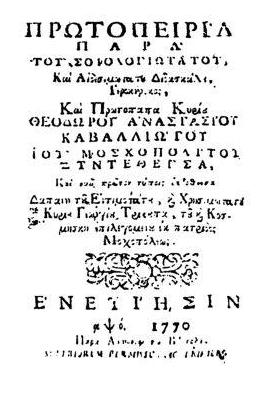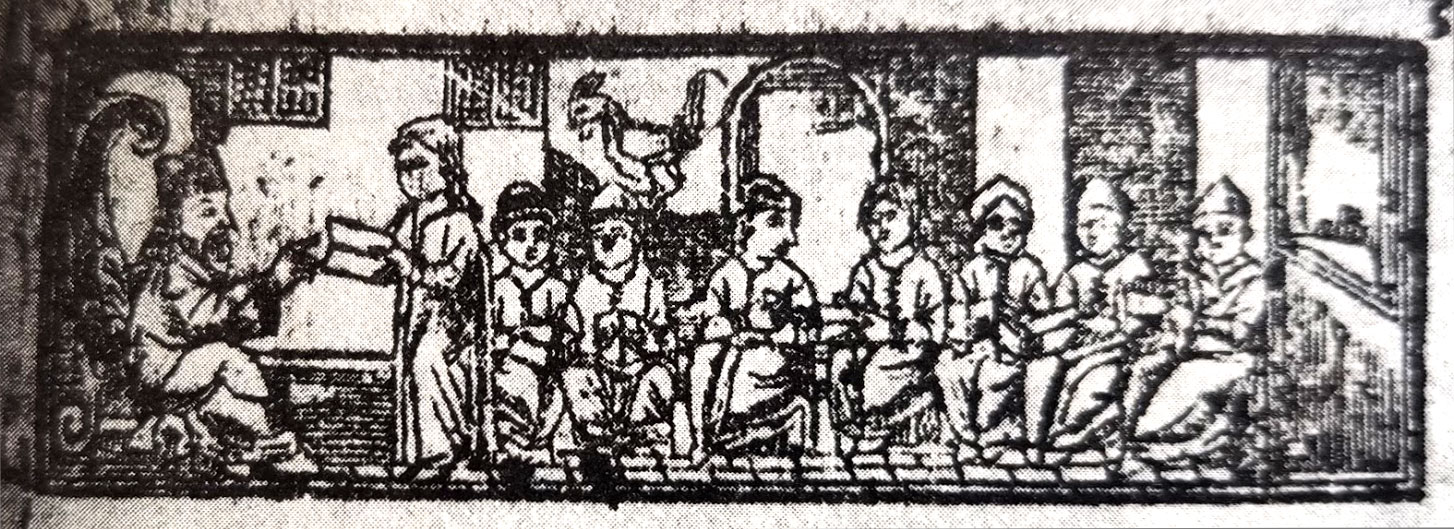Theodore Kavalliotis on:
[Wikipedia]
[Google]
[Amazon]
 Theodore Anastasios Kavalliotis (; ; , 1718 – 11 August 1789) was a
Theodore Anastasios Kavalliotis (; ; , 1718 – 11 August 1789) was a
 He returned to Moscopole and was appointed teacher at the
He returned to Moscopole and was appointed teacher at the
Greek Orthodox
Greek Orthodox Church (, , ) is a term that can refer to any one of three classes of Christian Churches, each associated in some way with Greek Christianity, Levantine Arabic-speaking Christians or more broadly the rite used in the Eastern Rom ...
priest, teacher and a figure of the Greek Enlightenment
The Modern Greek Enlightenment (also known as the Neo-Hellenic Enlightenment; , ''Diafotismós'' / , ''Neoellinikós Diafotismós'') was the Greek expression of the Age of Enlightenment, characterized by an intellectual and philosophical movemen ...
. He is also known for having drafted an Aromanian–Greek–Albanian dictionary.
Early life
Theodoros Anastasiou Kavalliotis was born inKavala
Kavala (, ''Kavála'' ) is a city in northern Greece, the principal seaport of eastern Macedonia and the capital of Kavala regional unit.
It is situated on the Bay of Kavala, across from the island of Thasos and on the A2 motorway, a one-and ...
or Moscopole, where he spent most of his life. He has been described variously as either Aromanian, Albanian
Albanian may refer to:
*Pertaining to Albania in Southeast Europe; in particular:
**Albanians, an ethnic group native to the Balkans
**Albanian language
**Albanian culture
**Demographics of Albania, includes other ethnic groups within the country ...
or Greek
Greek may refer to:
Anything of, from, or related to Greece, a country in Southern Europe:
*Greeks, an ethnic group
*Greek language, a branch of the Indo-European language family
**Proto-Greek language, the assumed last common ancestor of all kno ...
. Regardless, Kavalliotis had a Greek
Greek may refer to:
Anything of, from, or related to Greece, a country in Southern Europe:
*Greeks, an ethnic group
*Greek language, a branch of the Indo-European language family
**Proto-Greek language, the assumed last common ancestor of all kno ...
identity. He studied in Moscopole and later pursued higher studies in mathematical and philosophical sciences, at the ''Maroutseios'' college in Ioannina
Ioannina ( ' ), often called Yannena ( ' ) within Greece, is the capital and largest city of the Ioannina (regional unit), Ioannina regional unit and of Epirus (region), Epirus, an Modern regions of Greece, administrative region in northwester ...
(in 1732-1734), directed by Eugenios Voulgaris
Eugenios Voulgaris or Boulgaris (; ; 1716–1806) was a Greek Orthodox cleric, author, educator, mathematician, astronomer, physicist, and philosopher. He wrote about every discipline: legal, historical, theological, grammatical, linguistic, ...
.
Working period
 He returned to Moscopole and was appointed teacher at the
He returned to Moscopole and was appointed teacher at the New Academy
The Academy (), variously known as Plato's Academy, or the Platonic Academy, was founded in Athens by Plato ''circa'' 387 BC. The academy is regarded as the first institution of higher education in the west, where subjects as diverse as biolog ...
() in 1743. In 1750, he succeeded his former teacher Sevastos Leontiadis and became director of the New Academy for more than 20 years (1748–1769).Κεκρίδης (1988), p. 283 His works, written in Greek, are: ''Logic'' (1749, unpublished), ''Physics'' (1752, unpublished), ''Grammar'' of modern Greek (1760), ''Metaphysics'' (1767), ''Protopeiria'' (1770). They were used extensively and hand-made copies were found even as far as Iaşi, Romania
Romania is a country located at the crossroads of Central Europe, Central, Eastern Europe, Eastern and Southeast Europe. It borders Ukraine to the north and east, Hungary to the west, Serbia to the southwest, Bulgaria to the south, Moldova to ...
. After the destruction of Moscopole in 1769, he probably went to Tokaj
Tokaj () is a historical town in Borsod-Abaúj-Zemplén county, Northern Hungary, 54 kilometers from county capital Miskolc. It is the centre of the Tokaj-Hegyalja wine district where Tokaji wine is produced.
History
The wine-growing area ...
, Hungary
Hungary is a landlocked country in Central Europe. Spanning much of the Pannonian Basin, Carpathian Basin, it is bordered by Slovakia to the north, Ukraine to the northeast, Romania to the east and southeast, Serbia to the south, Croatia and ...
, but returned in 1773.
In 1770, he published in Venice
Venice ( ; ; , formerly ) is a city in northeastern Italy and the capital of the Veneto Regions of Italy, region. It is built on a group of 118 islands that are separated by expanses of open water and by canals; portions of the city are li ...
, at Antonio Bortoli's printing press, a school textbook, called ''Protopeiria''. ''Protopeiria'' is a 104 pages textbook, which in pages 15–59 included a trilingual lexicon of 1,170 Greek
Greek may refer to:
Anything of, from, or related to Greece, a country in Southern Europe:
*Greeks, an ethnic group
*Greek language, a branch of the Indo-European language family
**Proto-Greek language, the assumed last common ancestor of all kno ...
, Aromanian and Albanian
Albanian may refer to:
*Pertaining to Albania in Southeast Europe; in particular:
**Albanians, an ethnic group native to the Balkans
**Albanian language
**Albanian culture
**Demographics of Albania, includes other ethnic groups within the country ...
words. This work aimed at the Hellenization
Hellenization or Hellenification is the adoption of Greek culture, religion, language, and identity by non-Greeks. In the ancient period, colonisation often led to the Hellenisation of indigenous people in the Hellenistic period, many of the ...
of the non-Greek-speaking Christian
A Christian () is a person who follows or adheres to Christianity, a Monotheism, monotheistic Abrahamic religion based on the life and teachings of Jesus in Christianity, Jesus Christ. Christians form the largest religious community in the wo ...
communities in the Balkans
The Balkans ( , ), corresponding partially with the Balkan Peninsula, is a geographical area in southeastern Europe with various geographical and historical definitions. The region takes its name from the Balkan Mountains that stretch throug ...
. The lexicon was re-published in 1774 by the Swedish professor Johann Thunmann, who taught at the University of Halle-Wittenberg
Martin Luther University Halle-Wittenberg (), also referred to as MLU, is a public research university in the cities of Halle and Wittenberg. It is the largest and oldest university in the German state of Saxony-Anhalt. MLU offers German and i ...
. Thunmann added a Latin
Latin ( or ) is a classical language belonging to the Italic languages, Italic branch of the Indo-European languages. Latin was originally spoken by the Latins (Italic tribe), Latins in Latium (now known as Lazio), the lower Tiber area aroun ...
translation to the words in Greek, Aromanian and Albanian.
Besides Eugenios Voulgaris, he was also influenced by the work of Vikentios Damodos, Methodios Anthrakites
Methodios Anthrakites (; 1660–1736) was a Greek Orthodox cleric, author, educator, mathematician, astronomer, physicist, and philosopher.
He directed the Gioumeios and Epiphaneios Schools in Ioannina. He also supported the use of the people's ...
, René Descartes
René Descartes ( , ; ; 31 March 1596 – 11 February 1650) was a French philosopher, scientist, and mathematician, widely considered a seminal figure in the emergence of modern philosophy and Modern science, science. Mathematics was paramou ...
and medieval scholastics
Scholasticism was a medieval European philosophical movement or methodology that was the predominant education in Europe from about 1100 to 1700. It is known for employing logically precise analyses and reconciling classical philosophy and C ...
.
Kavalliotis couldn't manage to reestablish the destroyed New Academy. During his last months he witnessed another wave of destruction of his home place, in June 1789, by local Muslim
Muslims () are people who adhere to Islam, a Monotheism, monotheistic religion belonging to the Abrahamic religions, Abrahamic tradition. They consider the Quran, the foundational religious text of Islam, to be the verbatim word of the God ...
lords. Kavalliotis died at August 11, 1789, aged 71.Kekridis (1989): p. 68
Sample from the first page of the Lexicon
Works
*Εἰσαγωγὴ εἰς τὰ ὀκτω μέρη τοῦ λόγου. Ἐν Μοσχοπόλει 1760 καὶ Ἑνετίῃσι 1774. *Ἔπη πρὸς τὸν ἐξαρχικῶν ἐν Μοσχοπόλει ἐπιδημήσαντα Ἰωαννίκιον Χαλκηδόνος ἐν ἔτει 1750 Μαΐου 2. *Πρωτοπειρία. (''Starting out'') Ἑνετίῃσιν, 1770. Παρὰ Ἀντωνίῳ τῷ Βόρτολι. Superiorum permissu. Ac privilegio.References
Sources
* * * {{DEFAULTSORT:Kavalliotis, Theodore Lexicographers Greek Eastern Orthodox priests Aromanian clergy Albanian language Aromanians from the Ottoman Empire Pro-Greek Aromanians Greeks from the Ottoman Empire 1718 births 1789 deaths People of the Modern Greek Enlightenment People from Moscopole Maroutsaia School alumni 18th-century Eastern Orthodox priests People from Kavala 18th-century Albanian people 18th-century Albanian writers 18th-century Greek educators 18th-century Greek writers 18th-century lexicographers